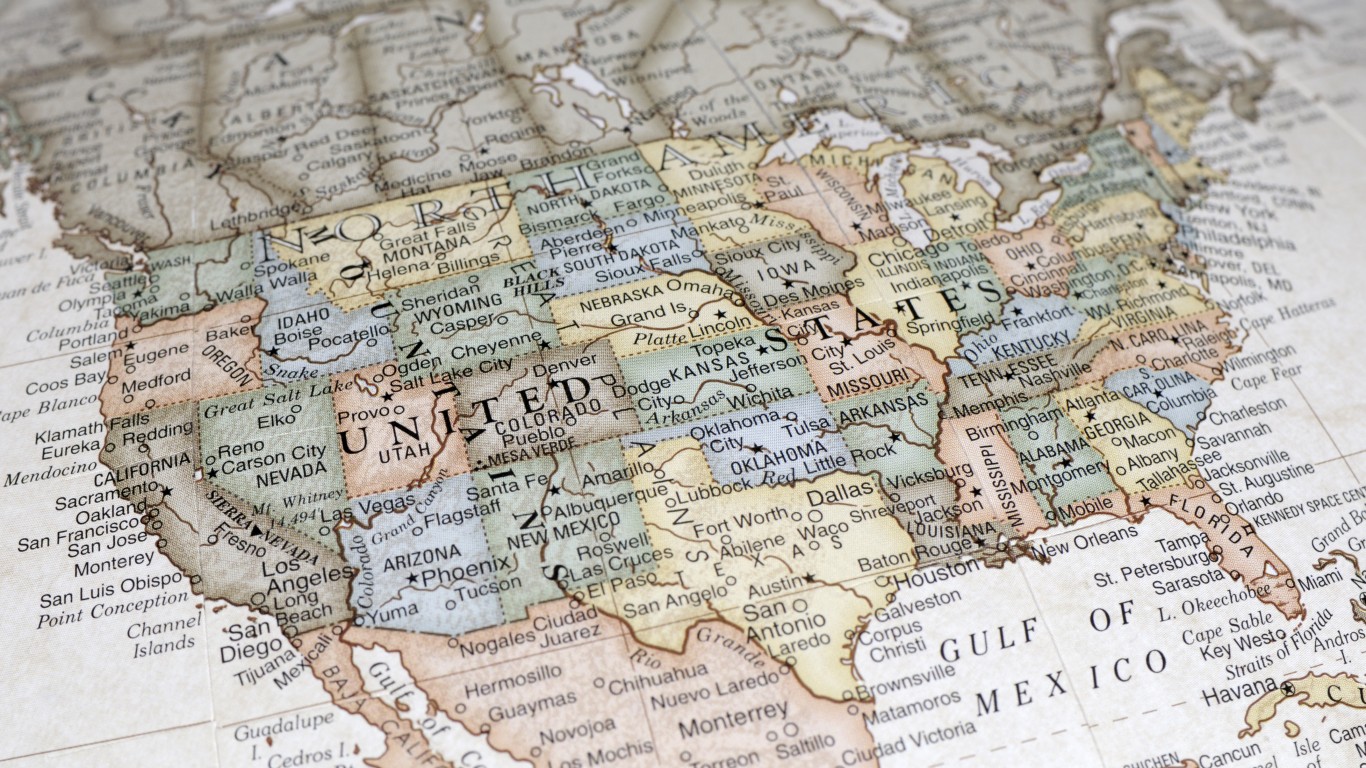
In 1960, according to the Census Bureau, New York state was the largest in America, based on population, at 16,782,304. That was up 13.2% over the 1950 figure. It was inevitable that New York would lose its position. Over the same period, California’s population rose 48.5% to 15,717,204 and would continue to surge. Florida barely made the top 10 by this measure.
Fast forward to 2020. New York is the fourth-largest state by population at 19,378,102. California is first at 37,253,956, followed by Texas at 25,145,561 and Florida at 18,801,310. Most likely New York will grow very little over the next decade, while the populations of Texas and Florida rise rapidly. California will be the largest state in 2040. (On the flip side, this will be America’s smallest state in 2040.)
State populations are important for several reasons, not the least of which is federal government aid and the number of members of the House of Representatives.
The University of Virginia Weldon Cooper Center for Public Services has a Demographics Research Group that forecasts population both by state and nationally. The work of their experts is well regarded, and their population projections “have been widely used by many federal agencies and states,” according to the center.
To find America’s largest states in 2040, 24/7 Wall St. reviewed National Population Projections from the Demographics Research Group. The group forecasts population by state and age, including population predictions by state in 2040.
By 2040, Texas will have come very close to being the largest state in America. California will have kept its first-place spot, and the spread between Florida and New York will have increased. New York’s population will have barely grown over the next two decades, while Florida’s will have jumped by over 30%. (By area, this is the largest state in America.)
Click here to see America’s largest state in 2040

25. Louisiana
> 2040 projected population: 5,062,780
> 2020 population: 4,742,900 (25th highest)
[in-text-ad]

24. Oregon
> 2040 projected population: 5,164,041
> 2020 population: 4,267,534 (24th lowest)

23. Wisconsin
> 2040 projected population: 5,997,137
> 2020 population: 5,837,176 (21st highest)

22. South Carolina
> 2040 projected population: 6,352,502
> 2020 population: 5,184,564 (23rd highest)
[in-text-ad-2]

21. Missouri
> 2040 projected population: 6,359,970
> 2020 population: 6,161,471 (18th highest)

20. Minnesota
> 2040 projected population: 6,364,886
> 2020 population: 5,683,666 (22nd highest)
[in-text-ad]

19. Maryland
> 2040 projected population: 6,842,902
> 2020 population: 6,161,345 (19th highest)

18. Indiana
> 2040 projected population: 7,095,000
> 2020 population: 6,737,581 (17th highest)

17. Colorado
> 2040 projected population: 7,692,907
> 2020 population: 5,843,359 (20th highest)
[in-text-ad-2]

16. Massachusetts
> 2040 projected population: 7,742,628
> 2020 population: 6,982,092 (15th highest)

15. Tennessee
> 2040 projected population: 7,823,662
> 2020 population: 6,861,856 (16th highest)
[in-text-ad]

14. Arizona
> 2040 projected population: 9,166,279
> 2020 population: 7,268,694 (14th highest)

13. New Jersey
> 2040 projected population: 9,470,012
> 2020 population: 9,088,074 (11th highest)

12. Washington
> 2040 projected population: 9,776,126
> 2020 population: 7,681,818 (13th highest)
[in-text-ad-2]

11. Virginia
> 2040 projected population: 9,876,728
> 2020 population: 8,655,021 (12th highest)

10. Michigan
> 2040 projected population: 9,960,115
> 2020 population: 9,992,315 (10th highest)
[in-text-ad]

9. Ohio
> 2040 projected population: 11,751,540
> 2020 population: 11,705,262 (7th highest)

8. Illinois
> 2040 projected population: 12,397,564
> 2020 population: 12,791,188 (6th highest)

7. North Carolina
> 2040 projected population: 12,658,927
> 2020 population: 10,568,033 (9th highest)
[in-text-ad-2]

6. Pennsylvania
> 2040 projected population: 12,809,150
> 2020 population: 12,844,885 (5th highest)

5. Georgia
> 2040 projected population: 12,820,271
> 2020 population: 10,725,351 (8th highest)
[in-text-ad]

4. New York
> 2040 projected population: 20,873,488
> 2020 population: 20,031,150 (4th highest)

3. Florida
> 2040 projected population: 28,886,983
> 2020 population: 21,877,257 (3rd highest)

2. Texas
> 2040 projected population: 40,015,913
> 2020 population: 29,604,099 (2nd highest)
[in-text-ad-2]

1. California
> 2040 projected population: 46,467,001
> 2020 population: 40,438,640 (the highest)
Want to Retire Early? Start Here (Sponsor)
Want retirement to come a few years earlier than you’d planned? Or are you ready to retire now, but want an extra set of eyes on your finances?
Now you can speak with up to 3 financial experts in your area for FREE. By simply clicking here you can begin to match with financial professionals who can help you build your plan to retire early. And the best part? The first conversation with them is free.
Click here to match with up to 3 financial pros who would be excited to help you make financial decisions.
Have questions about retirement or personal finance? Email us at [email protected]!
By emailing your questions to 24/7 Wall St., you agree to have them published anonymously on a673b.bigscoots-temp.com.
By submitting your story, you understand and agree that we may use your story, or versions of it, in all media and platforms, including via third parties.
Thank you for reading! Have some feedback for us?
Contact the 24/7 Wall St. editorial team.
 24/7 Wall St.
24/7 Wall St. 24/7 Wall St.
24/7 Wall St. 24/7 Wall St.
24/7 Wall St. 24/7 Wall St.
24/7 Wall St.
